The Samsung SSD 850 EVO mSATA/M.2 Review
by Kristian Vättö on March 31, 2015 10:00 AM ESTMixed Random Read/Write Performance
Mixed read/write tests are also a new addition to our test suite. In real world applications a significant portion of workloads are mixed, meaning that there are both read and write IOs. Our Storage Bench benchmarks already illustrate mixed workloads by being based on actual real world IO traces, but until now we haven't had a proper synthetic way to measure mixed performance.
The benchmark is divided into two tests. The first one tests mixed performance with 4KB random IOs at six different read/write distributions starting at 100% reads and adding 20% of writes in each phase. Because we are dealing with a mixed workload that contains reads, the drive is first filled with 128KB sequential data to ensure valid results. Similarly, because the IO pattern is random, I've limited the LBA span to 16GB to ensure that the results aren't affected by IO consistency. The queue depth of the 4KB random test is three.
Again, for the sake of readability, I provide both an average based bar graph as well as a line graph with the full data on it. The bar graph represents an average of all six read/write distribution data rates for quick comparison, whereas the line graph includes a separate data point for each tested distribution.
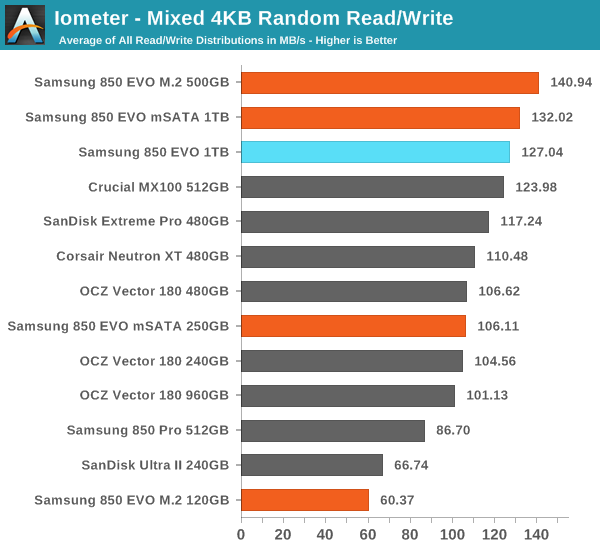
Mixed random performance appears to be brilliant and power consumption is moderate too.
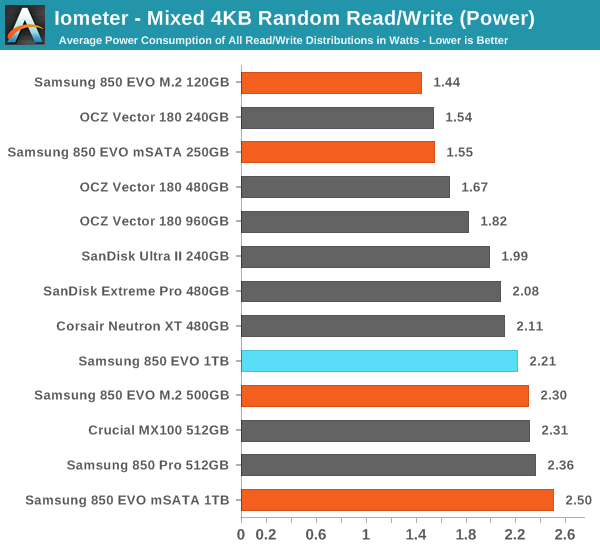
The 850 EVO has a typical curve at 250GB and above where the performance more or less stays constant until hitting 100% writes where it jumps up considerably. Only the 850 Pro breaks this trend as its performance in fact decreases as the share of writes is increased.
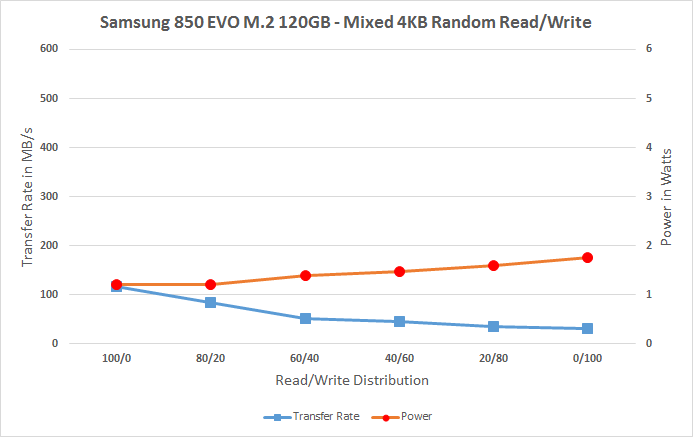 |
|||||||||
Mixed Sequential Read/Write Performance
The sequential mixed workload tests are also tested with a full drive, but I've not limited the LBA range as that's not needed with sequential data patterns. The queue depth for the tests is one.
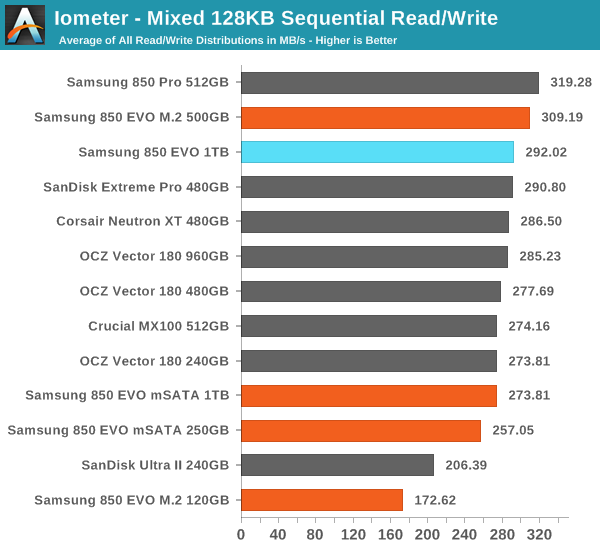
In mixed sequential workload the 850 EVO is good, but not overwhelming.
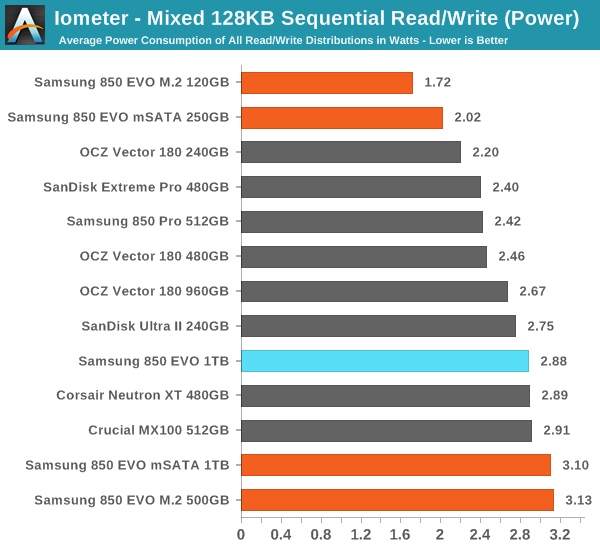
The 850 EVO's "bathtub" curve is a bit different from others' in the sense that the drop in performance is smooth rather than being sudden right after adding reads/writes to the mix.
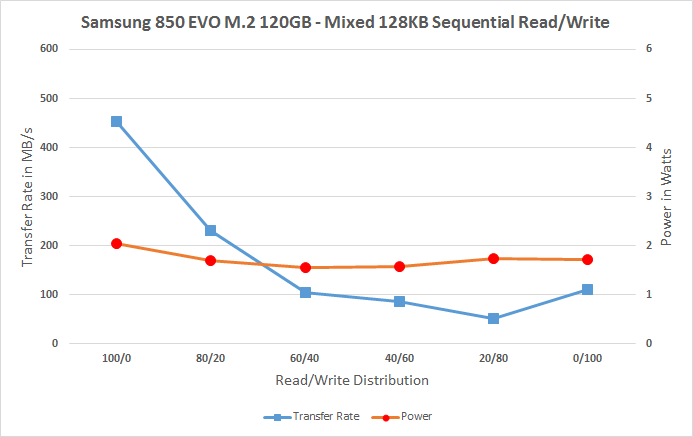 |
|||||||||










58 Comments
View All Comments
Laststop311 - Wednesday, April 1, 2015 - link
Was really disappointed with the 1TB results. Also disappointed no ultra m2 interface. I wont be upgrading until I can get a pci-e 3.0 x4 interface on the drive. The samsung sm951 is where its at.Laststop311 - Wednesday, April 1, 2015 - link
Really annoying that I dont see this drive for sale anywhere and it's been talked about for a loooong timeKristian Vättö - Wednesday, April 1, 2015 - link
RamCity just got its first SM951 batch, so it's now available for purchase.https://www.ramcity.com.au/upgrade/data-storage/in...
bricko - Thursday, April 2, 2015 - link
Is the 951 NVMe - How to they compare to the new Intel 750 series which are PCIe gen 3 and NVMeseen here
http://linustechtips.com/main/topic/340041-intel-l...
http://forums.overclockers.co.uk/showthread.php?p=...
Intel are launching the new 750 Series range of SSD's these are PCI-E 3.0 versions with 4 lanes and are NVMe based SSD's
goodyes - Wednesday, April 1, 2015 - link
Ya, but results that I have a 1TB 840 msata and write sequential at more than 500MBps around 520max MBps, and now I see than new 850 msata tops at ?? 480MBps ?? cannot be possible what my eyes look, AND WHY THE HELL NO ONE REVIEWER COMPARE With olders 840 msata, so I must think that all of you guys are a paid reviewers and you get money from samsung, if not, YOU MUST compare to older modelKenPC - Wednesday, April 1, 2015 - link
I am seriously concerned that the 840 evo, and TLC in general may indeed have an uncurable problem with slowdown after a period of time. This same problem has also been reported in multiple instances for Samsung OEM drives based on the 840 evo TLC technology.GIven that the 850 evo msata line was delayed by Samsung by about a month, it might be possible that the Anandtech review units were actually tested in late Feb and the go-ahead to publish the results only recently provided.
I did also notice that the estimated 'March" timeframe for a new 840 evo firmware has come and passed, as well as no drive magician support for the 850 evo m2/msata drives yet.
Anandtech results for the 1TB 850 evo unit are also quite concerning.
So, I also join the crowd asking for a look at the 850 evo 2.5 and msata drives after some time has passed to see if they suffer from the slowdown problem too.
And a rhetorical, but serious question - does anybody actually have a Samsung TLC drive that has NOT suffered from the slowdown as measured by the proper tools a few months after the drive was formatted/set up?
And kudos to Anandtech - for an SSD review that really tests the drives, not just a run of ATTO or such.
Per Hansson - Wednesday, April 1, 2015 - link
"anything that taxes the drive a bit more may run into the issue, which is basically that the drive stops for up to dozens of seconds (i.e. your system freezes). Until Samsung fixes that, I would advise against buying the 1TB version unless you have a very light workload (web browsing, email, etc.). I suspect it's fixable through a firmware update, but I'll have to wait for Samsung's reply to be sure of that."A wise man once said: if you wait for a firmware fix for your Samsung SSD's you will wait a long time.
He died of old age.
RIP Samsung 840 TLC drives.
Dzungpv - Friday, April 3, 2015 - link
Missing Temperature when idle, full load or stretch, i want this information before buy them .szhosain - Sunday, April 5, 2015 - link
As far as I can tell, you only tested the M.2 version of the Samsung 850 EVO in a 500GB size.Can we assume that the MSATA version of that drive and size will perform essentially identically?
voicequal - Monday, April 13, 2015 - link
Good catch on the poor mSATA 1TB performance during the performance consistency test. It harkens back to the early Jmicron stuttering days. I was similarly affected by the SanDisk U100 a few years ago. The system freezes, particularly when swap file is active, and disk throughput drops to low single digit MB/s. Hard to believe the most modern SSDs can still get into this state. Vanilla benchmarks don't show the problem.